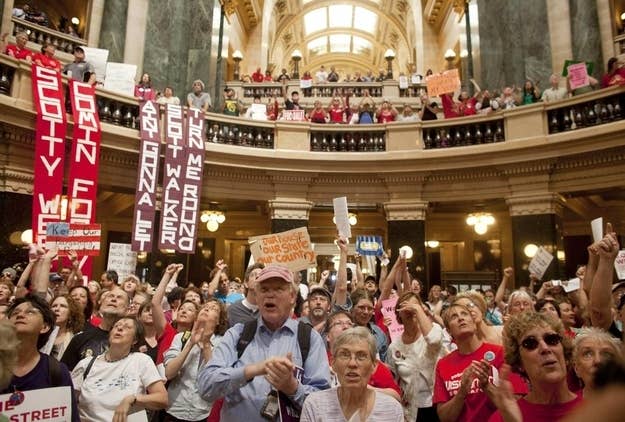
MADISON, Wisc. — Democrats here have an opportunity to do one of the rarest things in politics: To turn back the clock, and in a do-over of the 2010 gubernatorial election, to recall the combative, conservative governor elected in the Tea Party wave.
But while polls show the June 5 recall election is likely to be extremely close, leaders of both campaigns here say the Democrats face serious obstacles in terms of money, access to the polls, and an unexpectedly intense primary fight between former Dane County executive, Kathleen Falk, the union favorite, and Milwaukee Mayor Tom Barrett.
“If the Democrats have a primary, spend a bunch of money, throw stuff at each other, throw a fit, those kinds of things —watch what happens with labor when their anointed candidate is being taken on by a former Democratic nominee for Governor. That’s a mess,” said Ted Kanavas, a former Republican state senator. “That's a mess in the making. And from our perspective, it's, hey, they're spending money.”
Democrats, meanwhile, are putting the best face on the intramural skirmish.
The primary “will give Governor Walker only four weeks to know who his opponent is,” said Wisconsin Democratic Party Executive Director Maggie Brickerman.
In the meantime, the Walker side is running ads against both Falk and Barrett.
The recall effort is strictly split between the independent, anti-Walker effort and the two main Democratic campaigns, and organizers on the candidate side of the recall told BuzzFeed they’re worried that their efforts will be diluted by the primary; if it gets negative, it leaves them weaker going into the final showdown with Walker.
The Democrats are working to avoid that outcome: Barrett, who has run twice before for Governor and lost to Walker in 2010, has promised a “clean campaign,” and Falk released a statement welcoming him to the race and calling for the focus to stay on Walker. There’s also an unusual closeness between the campaigns, reflected in their staff — Falk communications director Scot Ross and his counterpart on the Barrett side, Phil Walzak, are longtime friends.
But while the labor showdown in Madison in 2010 turned Walker into a national target for Democrats and labor unions, deep-pocketed conservatives have rallied to his defense. And while major unions are pouring money and organization into beating him, Walker is likely to wind up with a spending edge.
Walker’s campaign has reported spending $7 million on television advertising to keep him in office, along with a barrage of direct mail. His have spent a mere $2 million since last November, according to an official at the Wisconsin Education Association Council, a key anti-Walker force.
Walkers’ wealthy allies include one of the largest individual Republican donors in the country, Texas homebuilder Bob Perry. The business-backed Center for Union Facts has spent about $1 million on anti-union ads in the state, while Americans for Prosperity, one of the constellation of groups backed by the Koch Brothers, spent $700,000 on its most recent ad buy alone.
The third issue with the potential to hurt the Democrats — one they have very little control over — is a voter ID law that could keep students away from the polls in June. The photo ID requirements in the law have been declared unconstitutional by a circuit judge, but the restrictions on residency and absentee voting remain: voters must prove 28 days of consecutive residency in order to vote, a restriction that Brickerman worries will block college students from voting (there are a total of 181,000 students in the University of Wisconsin system, and over 70,000 in the Madison and Milwaukee branches alone). The law also prohibits the use of a corroborator instead of proof of residence. The new restrictions could mean the difference in a particularly tight race.
Both sides benefit from bases that are exceptionally fired up and organized — according to Brickerman, more volunteers than ever are signing up to help out, and the other side says the same thing. And for right now, the issue is all-consuming in Wisconsin; nearly every race in the state has turned into a referendum on Walker, with Democratic candidates making him a key feature of their platforms.
The enthusiasm of the unions and primary campaigns is matched on the right, though; over 80 percent of Wisconsin Republicans support Walker, according to polls.
“Wisconsin voters have no desire to go backward to the failed policies of the previous administration that resulted in ballooning budget deficits and spending, rampant job loss, and rising unemployment,” said Wisconsin Republican Party spokesman Ben Sparks.
Washington County Republican Party chair Jim Geldreich said that he’s gotten more volunteers than ever lately.
“We've gotten a lot of people who have come into our campaign office who say they've never been involved in politics before, but they want to help the governor.”
